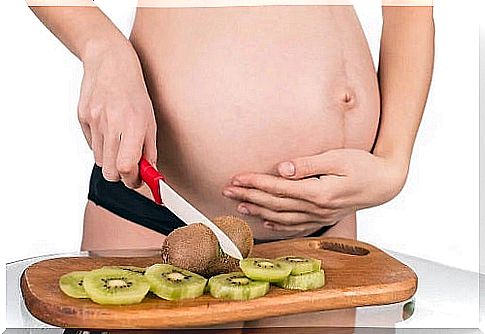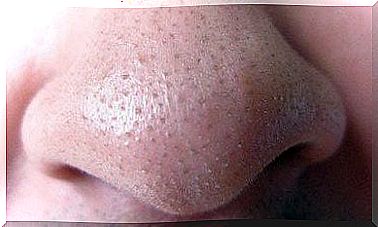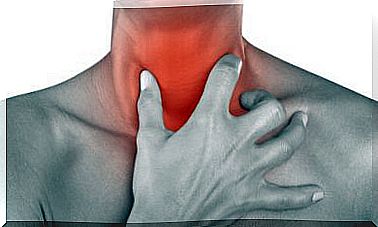Lack Of Appetite In Pregnancy

Women are most afraid of weight gain when thinking about pregnancy, but lack of appetite is more common than we think. However, there are ways to address the lack of appetite in pregnancy and make sure we eat what our bodies and babies need.
After hearing the big news, we may not be able to stop by our favorite restaurant without stopping for a snack. But the fear of not gaining weight can be replaced by: I’m not hungry, but I have to eat for two.
During the 40 weeks of pregnancy, we experience various symptoms and sensations. We feel the baby’s hiccups or other movements in the abdomen. Also, hormones and body changes can affect eating habits.
Lack of appetite in pregnancy… why can’t you eat?
Every woman is different and that is why every pregnancy is different. Maybe you want to eat strange food combinations, such as lentil jelly. Maybe you don’t notice the changes. But you do not have to worry if you suffer from lack of appetite in pregnancy, because it occurs, most likely, due to natural changes.
The reasons for lack of appetite during pregnancy can vary from one extreme to another. In 9 months, we experience so many physical, chemical and emotional changes.
Hormones

The so-called pregnancy hormone, human chorionic gonadotropin (HCG), is found in the blood only during pregnancy and is responsible for causing nausea and vomiting. These conditions are most likely the main causes of decreased appetite during pregnancy, especially in the first trimester.
HCG also causes the production of other hormones, such as estrogen and progesterone. The latter can also be an important factor when considering the lack of desire to eat, because progesterone slows down the digestion process.
Changes inside and out
When the body prepares to host a baby, the muscular structure of the stomach begins to relax. This is another reason why we may suffer from low appetite during pregnancy. General discomfort and fatigue can also affect the expectant mother.
In addition, the digestive system works slower in the second and third trimesters of pregnancy. The pressure on the small intestine caused by the growth of the uterus and the size of the fetus can slow down digestion, which in turn can affect the desire to eat.
Some women suffer from constipation or gas that causes stomach discomfort and slow digestion. This can reduce the urge to eat. Heartburn can also cause loss of appetite.
Summer months
During pregnancy, we perceive much more heat from the environment. If we take into account that pregnancy can overlap with the summer months and warmer weather, we most likely will not want to eat.
Similarly, we are more likely to suffer from conditions caused by seasonal changes, such as spring asthenia. That “exhaustion” we feel in early spring can cause symptoms such as fatigue.
Emotions
All the hormonal changes we experience make us more sensitive. If we take into account the stress and anxiety we experience when we wait for the arrival of the child, it is clear that we are overwhelmed by a lot of emotions.
This emotional outburst may be the psychological reason behind the lack of appetite. Also, mood swings can make us avoid favorite meals.
What to do when you lose your appetite during pregnancy?
The first thing we should do is consult a doctor who can rule out other important factors. There are simple medical tests that will check that the mother and baby are getting the right amount of vitamins and minerals needed for optimal health.
The doctor can also determine if we need something specific to supplement our diet. It is important to remember that at this stage we need to be more aware of what we eat. So it is best to follow the advice of a specialist.
Eat little and healthy. We recommend that you eat something light every two and a half or three hours. You need to prepare your stomach so that you do not overeat. This can also help activate digestion and metabolism, as well as prevent acidity.
If you suffer from morning sickness, keep some bread or biscuits by the bed to reduce the unpleasant sensation so that you can get out of bed.
What to eat and what not to eat

Learn to identify the foods that cause you the most discomfort, remove them from your shopping list and avoid them when eating in the city. Also, try to identify the ones you can tolerate that do not cause repulsion or bloating and include them in your diet.
Make sure you choose natural or unprocessed foods. Avoid heavy, salty foods with a lot of sauce, saturated fats and fried foods. The decisions you make about diet in the first few months of pregnancy are vital to your subsequent weight and health.
A pregnant woman’s diet should include plenty of fruits and vegetables. They provide the most nutrients, cause the least discomfort and provide fluids that meet the body’s needs.
There is a wide variety of legumes and vegetables that can be eaten. So there is no excuse for excluding them from the diet. Serving a fruit is the best option for snacks between meals. You can eat the fruits on the go; they are an energy stimulant and are rich in fiber, which helps improve digestion.
It is a good idea to make a weekly meal plan or at least prepare a daily one the night before. When you wake up, you will know what to eat at all meals of the day.
Serve a hearty breakfast, eat less at lunch and have a light dinner. Serve simple snacks between meals to avoid eating at all or buying junk food. Try to eat something every three hours, even if you have no appetite.
Prepare meals that can be refrigerated in advance. Avoid too complex recipes, as the smell may upset you. Vary the meals and look for different ways to prepare the food, so that you do not get bored of the same tastes.
The doctor will tell you to hydrate well during pregnancy, to maintain the proper functioning of the kidneys and to avoid fluid retention. This is also a good way to combat the lack of appetite in pregnancy.
Always choose water, herbal teas and low-sugar juices. Also, if you suffer from hot flashes during pregnancy, eat the following dishes at meals and snacks: gazpacho or purees that use a lot of vegetables.
Avoid a sedentary lifestyle

Walking, practicing yoga or low-impact exercises will help your digestive system function better. In addition, the correct fasting when you sit and eat helps in the digestion process. Exercise stimulates appetite during pregnancy.
Of course, this is not about excessive movement. Respects and values moments and days of rest. When you go to bed, it is preferable to be half-seated, not to lie down completely, in order to avoid reflux and the sensation of heartburn.
Final recommendations
Your body undergoes natural changes that are necessary for the proper development of pregnancy and the baby. The evil you face in the first trimester of pregnancy, which prevents you from enjoying food, passes quickly. You may come out of the first trimester with an “increased” appetite, which must be controlled by good eating habits.









